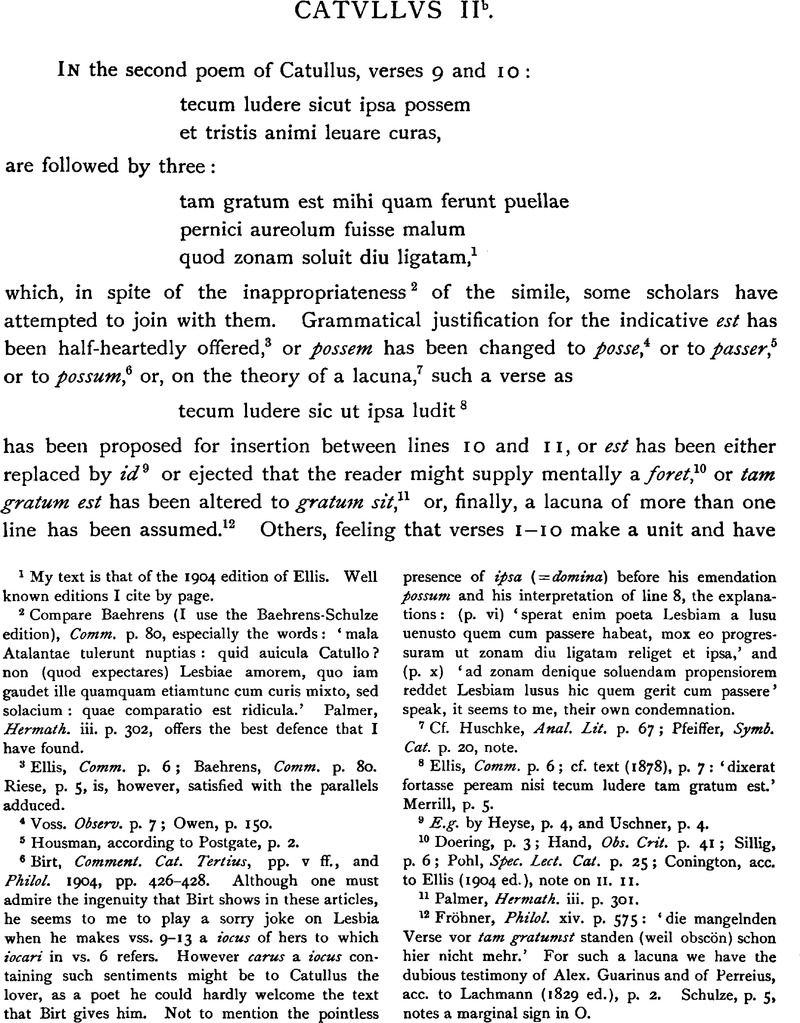No CrossRef data available.
Article contents
Catvllvs IIb
Published online by Cambridge University Press: 11 February 2009
Abstract

- Type
- Other
- Information
- Copyright
- Copyright © The Classical Association 1908
References
page 166 note 1 My text is that of the 1904 edition of Ellis. Well known editions I cite by page.
page 166 note 2 Compare Baehrens (I use the Baehrens-Schulze edition), Comm. p. 80, especially the words: ‘mala Atalantae tulerunt nuptias: quid auicula Catullo? non (quod expectares) Lesbiae amorem, quo iam gaudet ille quamquam etiamtunc cum curis mixto, sed solacium: quae comparatio est ridicula.‘ Palmer, Hermath. iii. p. 302, offers the best defence that I have found.
page 166 note 3 Ellis, Comm. p. 6; Baehrens, Comm. p. 80. Riese, p. 5, is, however, satisfied with the parallels adduced.
page 166 note 4 Voss. Observ. p. 7; Owen, p. 150.
page 166 note 5 Housman, according to Postgate, p. 2.
page 166 note 6 Birt, Comment. Cat. Tertius, pp. v ff., and Philol. 1904, pp. 426–428. Although one must admire the ingenuity that Birt shows in these articles, he seems to me to play a sorry joke on Lesbia when he makes vss. 9–13 a iocus of hers to which iocari in vs. 6 refers. However carus a iocus containing such sentiments might be to Catullus the lover, as a poet he could hardly welcome the text that Birt gives him. Not to mention the pointless presence of ipsa ( = domina) before his emendation possum and his interpretation of line 8, the explanations: (p. vi) ‘sperat enim poeta Lesbiam a lusu uenusto quem cum passere habeat, mox eo progressuram ut zonam diu ligatam religet et ipsa,‘ and (p. x) ‘ad zonam denique soluendam propensiorem reddet Lesbiam lusus hie quem gerit cum passere‘ speak, it seems to me, their own condemnation.
page 166 note 7 Cf. Huschke, Anal. Lit. p. 67; Pfeiffer, Symb. Cat. p. 20, note.
page 166 note 8 Ellis, Comm. p. 6; cf. text (1878), p. 7: ‘dixerat fortasse pereara nisi tecum ludere tam gratum est.‘ Merrill, p. 5.
page 166 note 9 E.g. by Heyse, p. 4, and Uschner, p. 4.
page 166 note 10 Doering, p. 3; Hand, Obs. Crit. p. 41; Sillig, p. 6; Pohl, Spec. Led. Cat. p. 25; Conington, ace. to Ellis (1904 ed.), note on II. II.
page 166 note 11 Palmer, Hermath. iii. p. 301.
page 166 note 12 Fröhner, Philol. xiv. p. 575: ‘die mangelnden Verse vor tam gratumst standen (weil obscön) schon hier nicht mehr.‘ For such a lacuna we have the dubious testimony of Alex. Guarinus and of Perreius, ace. to Lachmann (1829 ed.), p. 2. Schulze, p. 5, notes a marginal sign in O.
page 167 note 1 The words of Westphal, p. 51: ‘Man wird zugeben müssen dass jeder weitere Vers, der noch hinzukommen würde, der Schonheit des Gedichtes Abbruch thun müsste,‘ have my cordial assent.
page 167 note 2 Froehlich, Abh. d. I. Cl. d. k. Ak. d. Wiss. V. Bd. iii. Abth. p. 1.
page 167 note 3 Pleitner, Des. Q. V. Cat. Hochzeitgesänge, pp. 90–91, note, shows how the separation might have arisen. Cf. Süss, Catulliana, 1. pp. 2 ff.
page 167 note 4 Pleitner, p. 90, note; Schwabe, Quaest. Cat. p. 298, and others.
page 167 note 5 Süss, Catulliana, 1. p. 2; Baehrens (text, 1876 ed.), p. 5; Benoist, p. 361.
page 167 note 6 Weise, Zur Kritik des Catull, p. 17.
page 167 note 7 The objections of Pohl, Lect. Cat. Spec. pp. 21–22; Schöll, Fleckeisen's Jahrbücher, cxxi. p. 495; Richter, Catulliana, p. 1, and Riese, p. 5, far out-weigh with me such interpretations as those of Baehrens, Comm. p. 81, and of Benoist, p. 362. Cf. Schmidt, p. cix.
page 167 note 8 xivb. may be the beginning (Süss, Catulliana, I. p. 3) of a lost introductory poem. See von Leutsch, Phil. xxxv. p. 695. Westphal, p. 200, would connect it with the poems to Furius and Aurelius.
page 167 note 9 Richter, Catulliana, p. I, and Baehrens, Comm. p. 81, have done their best to support this sequence.
page 167 note 10 Cf. Munro, Crit. and Eluc. p. 9.
page 167 note 11 Rev. de Phil. 1903, p. 270.
page 167 note 12 Westphal, pp. 2 ff.; Süss, Catulliana, 1. p. 28; Harnecker, Beitrag zur Erklārung des Catull, pp. 3–4.
page 167 note 13 Spengel also (ace. to Ellis, Text ed. 1878, p. 7) thought that its subject was the sparrow. Cf. Schmidt, Prol. p. xcvii.
page 168 note 1 I subscribe fully to the views of Postgate in the Jaurn. of Phil. xvii. p. 252.
page 168 note 2 We need not, of course, insist on this particular noun, nor, in fact, on a noun-construction at all; various suggestions as to the actual words in the preceding line or lines are possible.
page 168 note 3 Ovid, however, makes Atalanta already in love with Hippomenes. Met. x. 635.
page 169 note 1 Servius on the Aen. iii. 113.
page 169 note 2 Westphal, p. 49.
page 169 note 3 This is perhaps dubious. Cf. Merrill, p. 185, note on 73–130.


